The quiet satisfaction of building my cities
I played two city builder games that graduated from early access this week - Becastled and Farthest Frontier, and they reminded me why I love the genre so much. This isn’t a review, it’s a love letter to a specific feeling city builders invoke. Maybe you’ll see a game you didn’t know about and choose to pick it up.
If you don’t know what a city builder is - it’s a game where, well, you build a city. These are often mostly low stress, real time games, where you build out a simulated city and deal with issues as they arise - from food shortages to traffic congestion. It’s cozy, it’s fun, and hours tend to pass in a blink of an eye. These games just tune into the right frequency for my mind.
Self-directed fun
I’m a free-spirited man. When I was little, I always skipped cutscenes and dialogs so I could get to the action quicker. When I got a little older, I gained more appreciation for games as a storytelling medium, and I sat through every cutscene and line of dialogue there is. As I get even older now, I find myself less drawn to cinematic experiences, and more attracted to the games that just get to the action and let me mess around in a sandbox.
The best part about the city builders is that I get to make my own fun. I’m a huge fan of setting my own objectives, figuring things out at my own pace, and stumbling around until I figure something out. City builder games tend to scratch that itch really well.
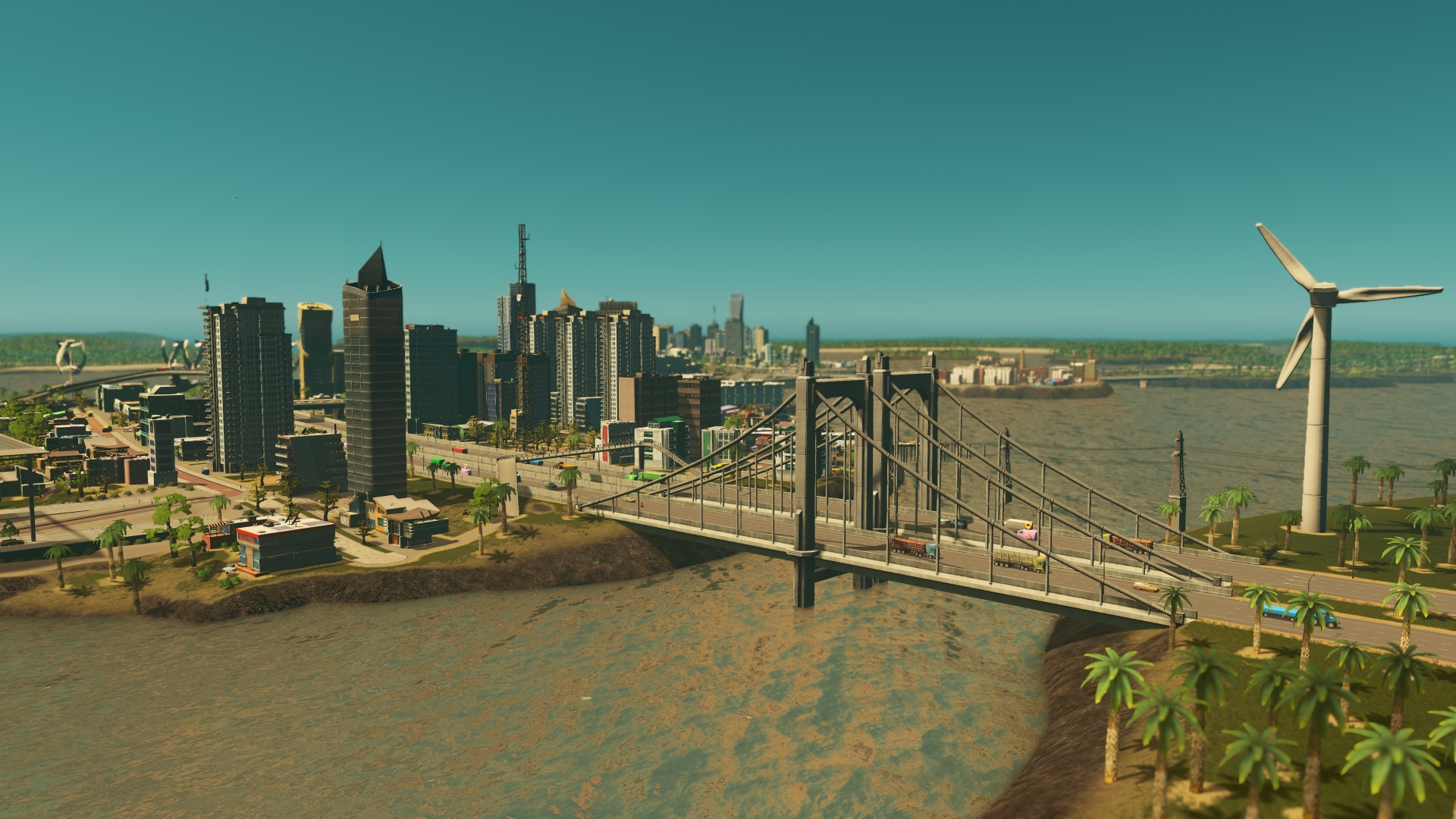 Cities: Skylines - the bigger your city gets, the more options open up - like the ability to build high rises, or fancy bridges.
Cities: Skylines - the bigger your city gets, the more options open up - like the ability to build high rises, or fancy bridges.
Many games offer progression modes based on milestones, but those milestones tend to be pretty broad - like Cities: Skylines offering more zoning types, specialized buildings, or new transportation options as your population increases. And you’d think that clearly directs the play, but I still find lots of ways to express myself and set my own goals within each “size bracket” for my city.
Some games, like Surviving Mars, allow even further customization of your journey through tech trees. These really help in making each unlocked technology or building feel purposeful, because I saw, I came, and I conquered (the technology). Foundation did something interesting here too, letting you center your playthrough around civic, pious, or military focus - which influenced your goals and unlocked buildings.
If I want to spend hours optimizing production ratios - neat. Solving traffic jams and pathing issues? Great! Beautifying the city? Now’s the time! Or maybe I just want to slow the game down and watch a few villagers walking about performing their daily chores under my watchful eye.
Granular difficulty
Look, I like stressful games. Cue the line about Dark Souls, or Resident Evil, or other games that make me a little uncomfortable. It’s great to have my own boundaries pushed in a safe and familiar medium. But there’s a time and a place for that, and sometimes I want to have a very specific, very particular type of an experience.
There’s lots of customization when it comes to the difficulty of your experience in city builders.
City builders tend to all share slowly escalating complexity. You start off simple - with a couple of houses, and a couple of resources to manage. Before you know it, you have a bustling metropolis on your hand with dozens of types of resources and complex production chains to manage. You can spend as much time as you want at each phase - and get a handle on all the mechanics before your little village becomes a bustling city.
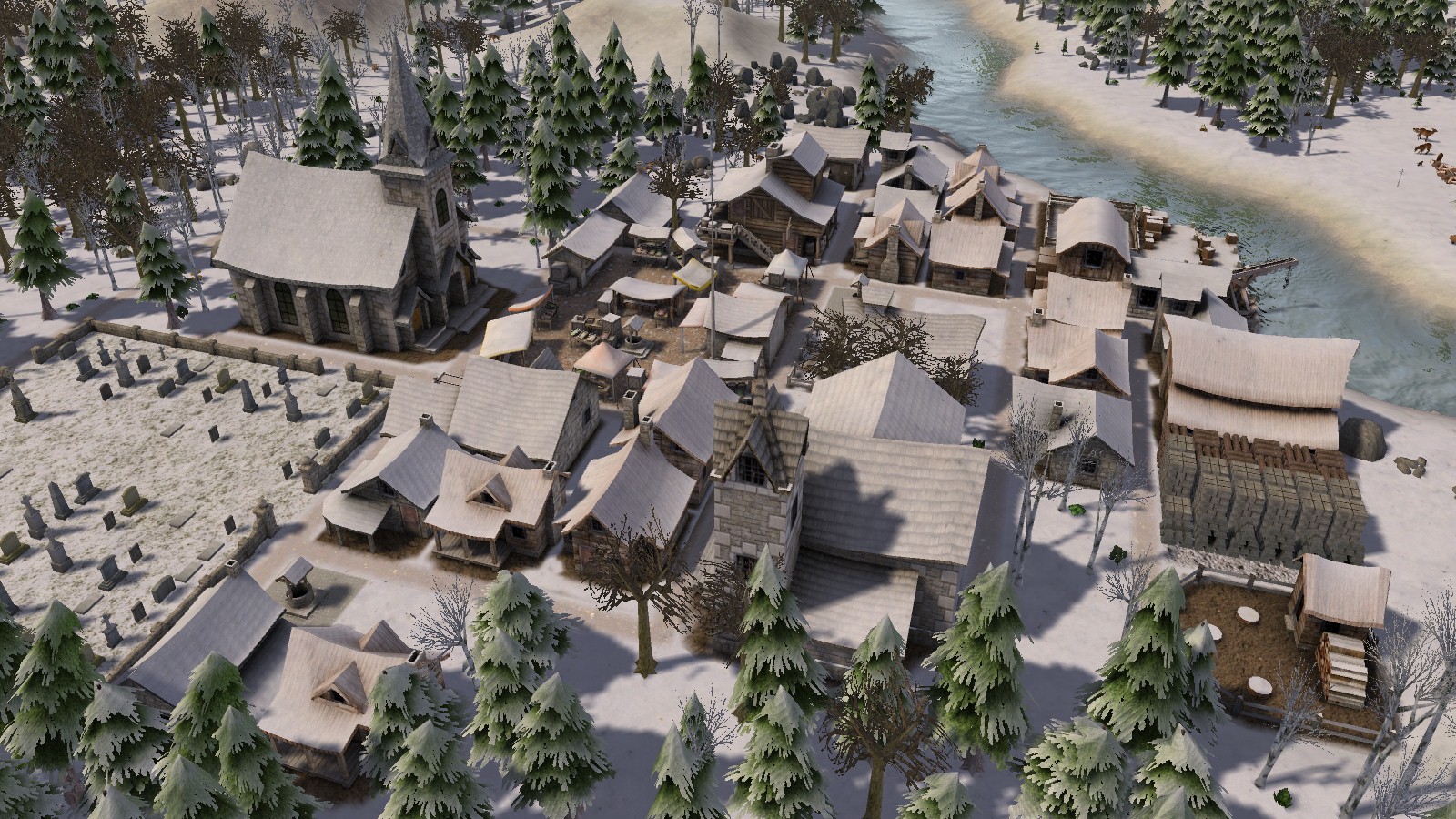 Banished: The winters are harsh and often lead to game resets.
Banished: The winters are harsh and often lead to game resets.
Then there’s the controls before you start the game. Like the harshness of winters and resource availability in Banished. I had a fantastic time trying to figure out how to survive in a boreal valley with terrible soil and low temperature. Or turning up natural disasters in Cities: Skylines and figuring out how to protect your city from tornadoes, earthquakes, and wildfires - and how to deal with the consequences when those inevitably happen.
I like how many options city builders tend to give the players. For example, Workers & Resources: Soviet Republic allows you to turn on a “realistic mode”, where you have to produce or import every resource, deliver that to a work site, and then have your citizens or immigrant workers work at that construction site for quite some time. Or you could just play in a “normal mode”, where you click a button, and the building is instantly constructed using cash on hand.
Then, of course, there’s the straight up hostile activities against your city. Like the presence of raiders in the Farthest Frontier - raids get increasingly complicated to deal with and add tension to each playthrough. They might not slaughter your whole village (although they might), but the raiders will sure as hell steal your grain and gold if you don’t invest in formidable defenses.
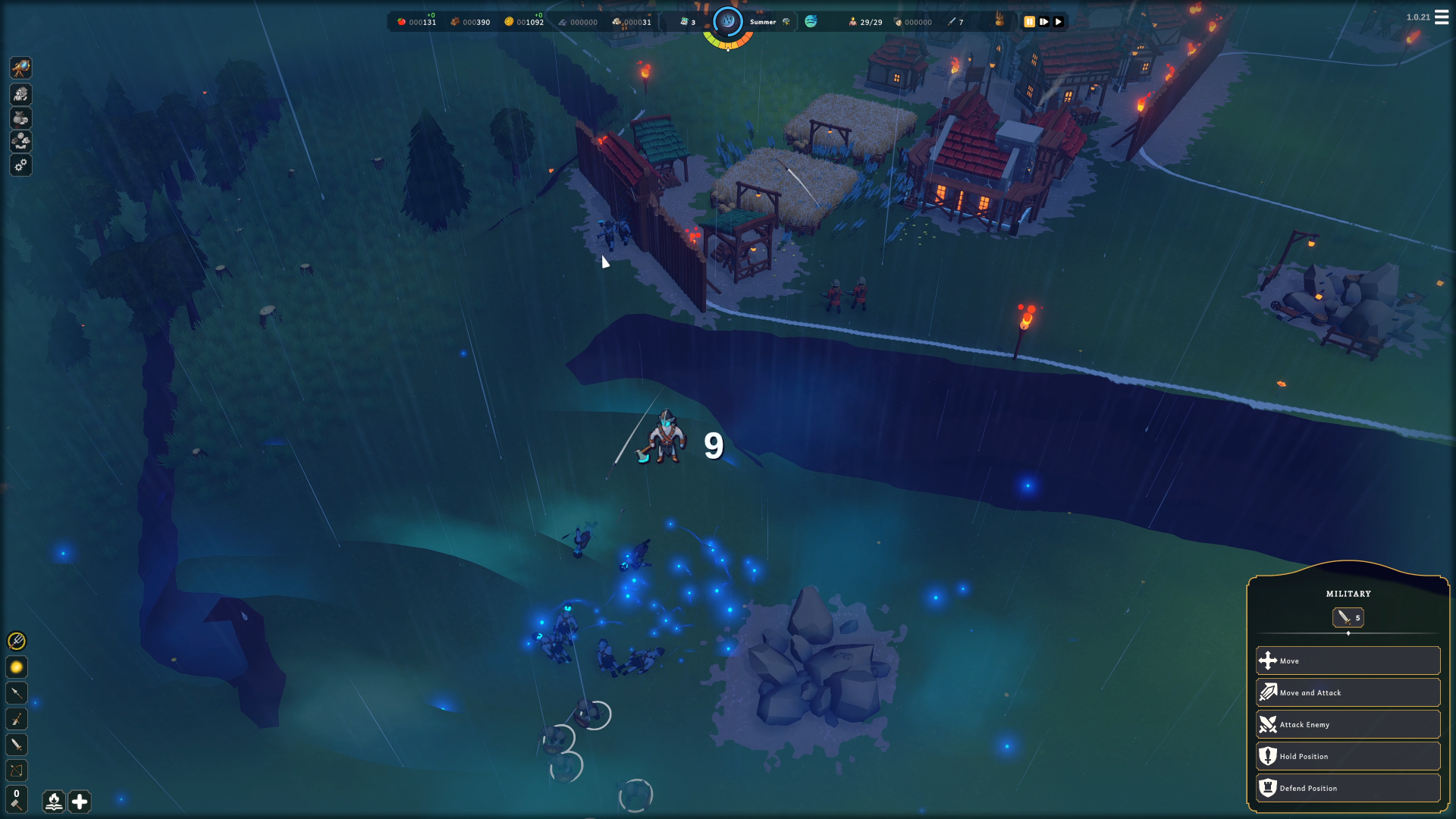 Every 10-or-so minutes a night comes in Becastled, and you have to fend off increasingly large enemy waves.
Every 10-or-so minutes a night comes in Becastled, and you have to fend off increasingly large enemy waves.
Or you could just, say, play Becastled (or a rather similar Kingdoms and Castles), which is a town building/tower defense game - where every day you prepare for increasingly hostile raids. There’s Against the Storm too, a roguelite city builder that’s almost solely focused on conquering hostile environments one at a time. Or Frostpunk, a city builder where your city will inevitably fail, and you’ll just have to deal with the damage control.
There’s such a huge variety of games within the genre, and the experience can be extremely customizable within each game - I like that about city builders.
Watching the little people
I also really like slowing down and just looking at the beautiful city I built and the bustling activity within.
I find Foundation (read my review) to be unmatched here, since it’s one of the city builders that moved away from the grid - which results in beautiful, organic designs. I think the beautiful city layouts are one of the primary reasons I keep coming back to city builders. Because zooming out and looking at something you made never gets old.
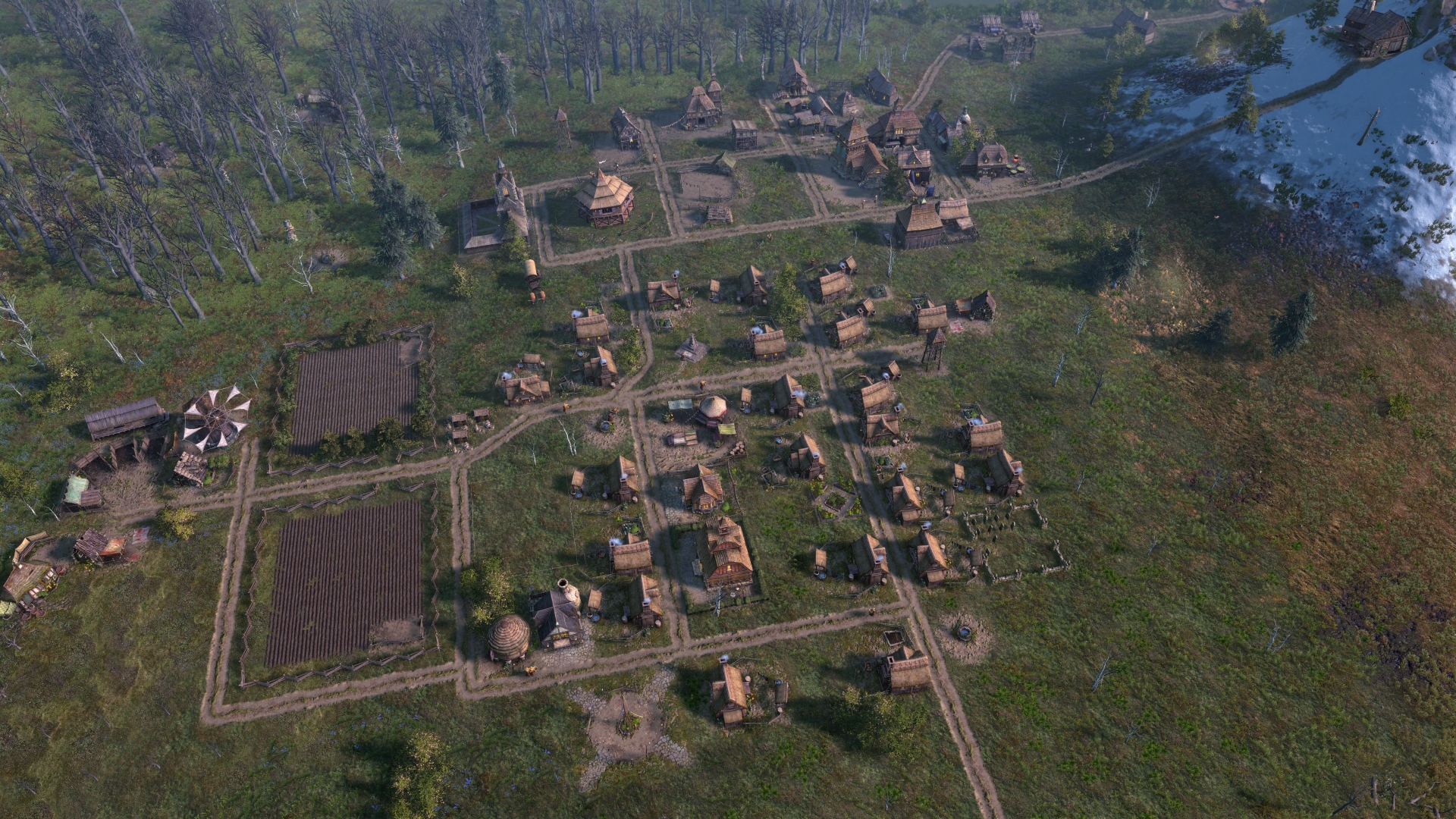 Farthest Frontier: This might not be much to look at for someone else, but I remember every building I placed - and that makes every city I build special.
Farthest Frontier: This might not be much to look at for someone else, but I remember every building I placed - and that makes every city I build special.
Lots of games utilize mechanics to make the cities more appealing too - like the adjacency bonuses, noise/pollution auras, or irregular terrain shapes to build upon. For instance I found the fact that Foundation asks you to wall a portion of your city to upgrade buildings to the higher tier to be an amazing game design choice. That’s how you get an organically looking walled in town center - walls aren’t cheap, and you can’t afford to wall off the whole city anyway.
Farthest Frontier has done something similar with the need to wall off stockpiles and vaults from the raiders - those sneaky bastards. Oh, and of course we can’t forget how every city builder ever assigns some value to decorations placed next to buildings. Yeah, integrating decor into gameplay kicks ass and I hope that trend never stops. Look, even Against the Storm requires decor in order to upgrade your town center - and that game’s all about fighting against the unforgiving environment.
When I was a kid, I played with LEGOs a lot, and the city builders cover two really important aspects of LEGO play. There’s all the building, and admiring your creations. And then there’s the play - I remember imagining the little figurines go through all kinds of scenarios in my head - in a world with friends, adversaries, and their own agendas to accomplish.
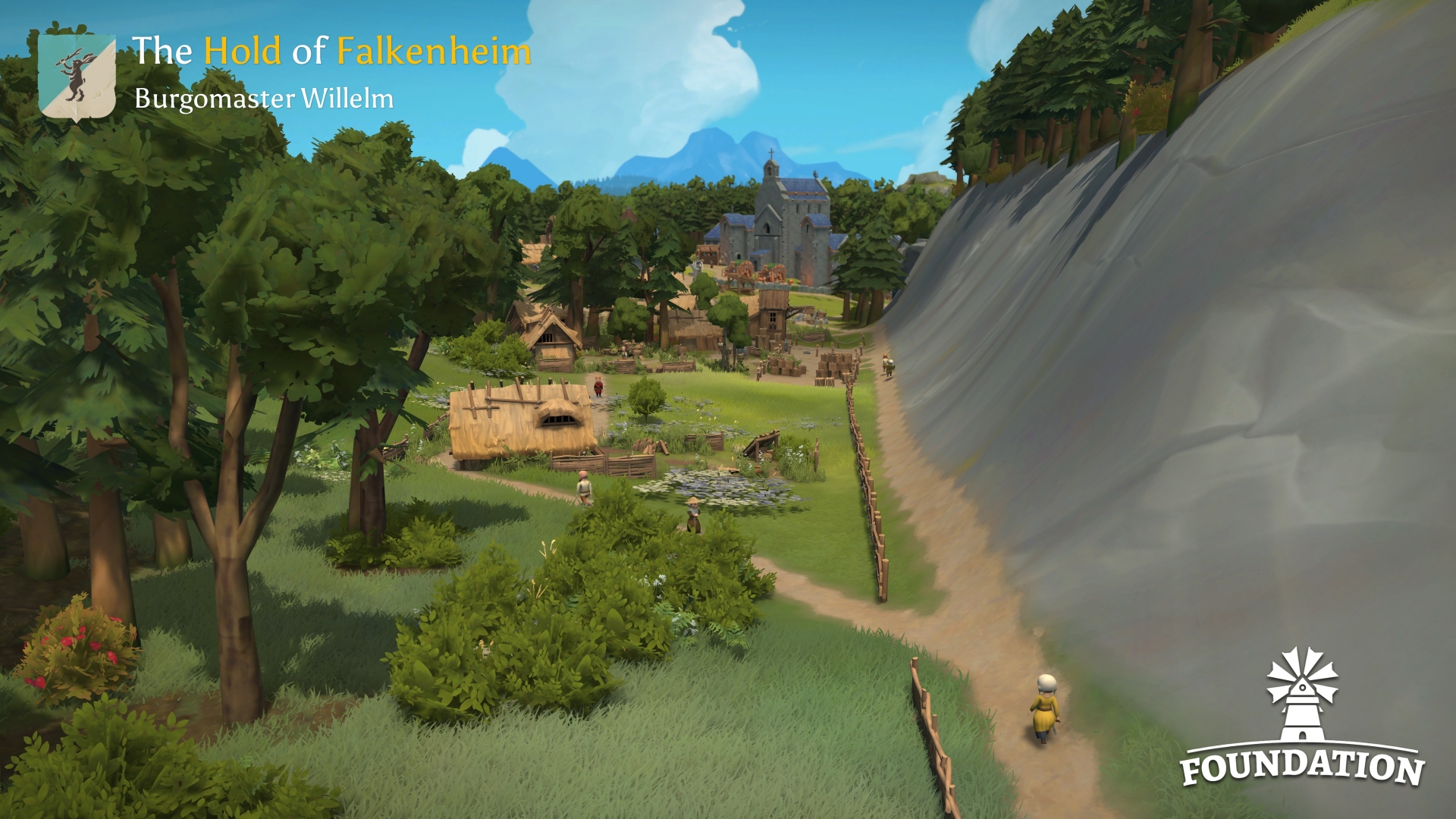 Foundation: All of these big-headed villagers have homes, markets, job sites, and other areas to visit.
Foundation: All of these big-headed villagers have homes, markets, job sites, and other areas to visit.
Watching your little sims (or whatever they are) never gets old, and helps uncover hidden inefficiencies. I still remember when I followed a single resident around in Cities: Skylines only to discover that the public transit systems I’ve set up were woefully inefficient in getting them to their work. I redesigned the transit map from the ground up - thanks Joe Smith, you will not be forgotten, even if I had to bulldoze down your house for a monorail line.
Look, I even like games that are focused purely on the aesthetics. Islanders makes you place buildings on a small piece of land in the middle of an ocean, and you get points based on adjacency bonuses between the buildings. The game’s over once you run out of space or points. The end - but each short game creates gorgeous towns with organically formed districts.
Optimization challenge
Lots of games offer the optimization challenge I deeply enjoy. I like Factorio or Satisfactory as much as the next guy, and they’re truly unparalleled when it comes to automation and optimization - but there’s rarely a time to sit down and enjoy all the work you’ve put in. Problem’s solved, no time to admire the complex solution - onto the next problem we go.
City builders require optimizing production chains, but also give you the time to relax, smell the roses, and enjoy the fruit of your labor. I enjoy tweaking my ratios in Farthest Frontier, Anno 1800, or Surviving Mars - but I know I’ll have some downtime, and I’ll switch to another activity once I’m done.
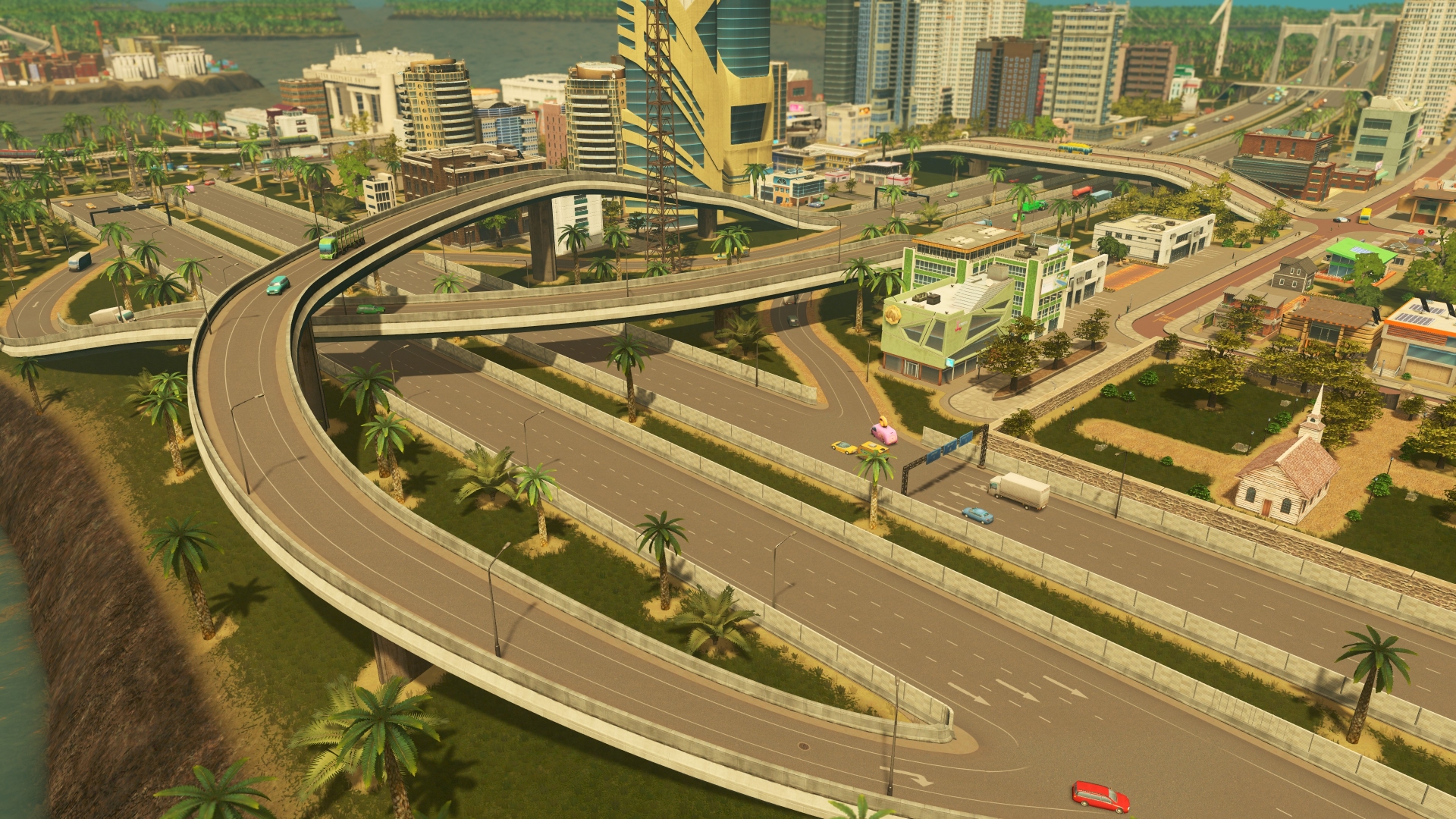 Picking the right intersection for the job and seeing the traffic flow never gets old in Cities: Skylines. Feels great.
Picking the right intersection for the job and seeing the traffic flow never gets old in Cities: Skylines. Feels great.
Optimization becomes really fun in games which simulate individual people - going from home to their work spaces and to their leisure spaces. Figuring out traffic in Cities: Skylines (which should really be called Cities: Traffic Simulator) is a really fun logistical challenge (which makes you go deep into civic engineering rabbit holes, since real world solutions to your problems already exist - and no, I’m not talking about more roundabouts).
Can’t talk about optimization without bringing up the unforgiving Pharaoh games (or a recent faithful remake - Pharaoh: The New Era). Pharaoh is… tough. There’s often only a few right way to do things, and you arrive there through trial and error. Limited space, limited resources, and consistent threats are major constraints. But figuring out each map is its own type of a puzzle, and is really rewarding.
That right there is one of the reasons I keep coming back to city builders - I have so many options for what I’d like to do. Build, optimize, plan, set policies, fight, decorate, spectate - each activity is different, a different level of challenge, a different kind of fun.
Late game issues
Yeah, I enjoy many things about city builders - but there’s one thing city builders really struggle with. And that’s the late game. Where the simulation starts breaking down.
The games are often characterized by constant upward momentum - increase in population, new unlocked technologies and buildings, new scenarios to respond to - but in late game many titles struggle. Production chains become harder to manage - the tools which work well for managing a single foundry break down when you’re trying to optimize a dozen.
I heard Frostpunk 2 addresses this issue somewhat by already starting you off with a fully built out city which will dwindle under your control - somewhat of a reverse city builder. I haven’t yet played the title and I’m curious how well Frostpunk 2 manages to pull this off.
Late game issues piling up are often my cue to stop playing. It’s also an abrupt end to this article. Bye.
Comments
Respond directly on Bluesky (threads shown below) or Medium (view comments there).
 Rooslawn's Unmapped Worlds
Rooslawn's Unmapped Worlds